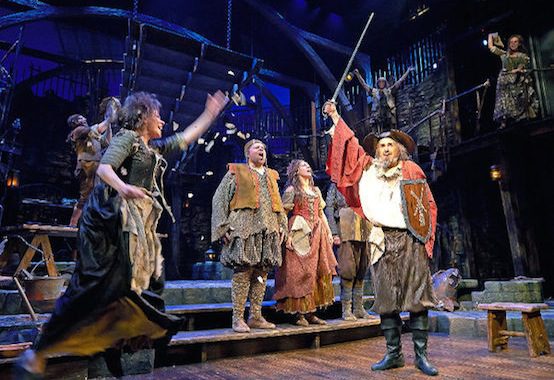All Bad Poetry Is Sincere: Man of La Mancha at the Stratford Festival

I resist, in general, the tired conservative complaint that the ’60s ruined everything. Except in one area: the great American musical. From Hello, Dolly! to Hair, it’s a parade of false, manipulative, overwrought sentiment.
Sometimes, a production will be so good that I forget my objections, at least for the duration of the show – such was the case with last year’s Fiddler on the Roof at Stratford. And sometimes, no matter how good the production, it still won’t be enough. Such was the case with this year’s Man of La Mancha.
I should stress that Don Quixote is one of my favorite books of all time, one I’m over-due to re-read and which has served as inspiration for a number of (mostly unfinished) projects of my own. But the musical adaptation could not be further from it in spirit. Gone is the picaresque, and with it all social commentary. Gone is the fruitful ambivalence we feel towards the Don and his madness. Gone is Sancho’s peasant cunning. Gone, most indefensibly, is any motion, any activity at all – the musical begins with Miguel de Cervantes in prison, and fundamentally never those claustrophobic confines.
Instead, what Leigh, Darion and Wasserman give us is a hymn to self-aggrandizing fantasy. And for all the Don’s pretensions to chivalry, self-aggrandizing is the right word. How else can one account for the appalling treatment of Aldonza – by the writers, not the muleteers?
This woman is idolized by Don Quixote as his chaste and pure Dulcinea. He doesn’t see who she could be, her potential; he sees a pure and total fantasy, with no relationship to reality – indeed, he knows nothing at all about her reality, and he does not want to know. She’s disturbed by his devotion, then angered, asking him for the simple recognition of seeing her as she is, loving her for that, if he can, not for a fantasy. The Don won’t budge. But he does come to her rescue when she is treated brutally by that night’s john, and as a consequence of his intervention she is gang-raped and beaten. And even when she throws this abuse at his feet, the Don won’t change: he sees what he wants to see.
But who shows up at the Don’s bedside, to rekindle the fires of imagination when he has made his Christian peace with the necessity of dying? Aldonza, who now proclaims that he enabled her to see something more true than her reality, and that all the abuse she suffered doesn’t matter so long as she can dream that impossible dream. That we’re told, by the musical itself, that this ending has been invented by Cervantes to satisfy the demands of his audience of fellow-prisoners, only makes the insult to the actual audience – who, of course, are similarly gratified – commendably plain and direct.
Man of La Mancha must surely be Paul Wolfowitz’s favorite musical. They should perform it in DC some time with a case of Iraqi refugees, and see how people react.
As for this production: the principal artistic choice of director Robert McQueen and designer Douglas Paraschuk is to keep the reality of the prison where Cervantes is staging his play continually present, a la Marat/Sade. If the underlying argument of the musical were more persuasive, this could be a powerful choice; given the extreme weakness of that argument, the main result I discerned was that I was not carried away by the Don’s fantasies. I never experienced the delight that Sancho or the Innkeeper clearly feel in being charmed by the mad knight, and never saw the world as Quixote sees it. Tom Rooney’s performance similarly leans toward the Cervantes end of his dual role – I never forgot that this was a man playing Quixote rather than Quixote himself. On the plus side, his was a very real-feeling Cervantes – I felt his need to play Quixote, which was quite touching, more than any authentic madness.
Steve Ross was an absolute delight as Sancho, the real highlight of the show from my perspective – he seemed completely genuine, never mugging, and his comic timing was impeccable. Shane Carty was also a pleasure to watch and listen to as the Innkeeper and the judge of Cervantes’s trial by his fellow prisoners, and I could listen to Sean Alexander Hauk (the Padre) sing just about anything. I didn’t find Robin Hutton’s Aldonza terribly convincing, but I really do think it’s a thankless role – I almost think I’d find a performance more alarming if it did convince me.
I understand that the big musicals are a key financial tent pole for the Festival, and that therefore they have every reason to be especially conservative about programming in this area. And there’s no question, the popularity of the big ’60s meatballs appears to be undiminishable. But in the past twenty years, Stratford has programmed Camelot twice, Fiddler on the Roof twice, and now Man of La Mancha for the second time. By contrast, they haven’t done Carousel since 1991. They haven’t done Candide since 1978. They’ve never programmed A Little Night Music, nor have they ever done The Most Happy Fella.
Of course, in the past few years Stratford has also programmed musicals like Jesus Christ Superstar and Jacques Brel Is Alive and Well and Living in Paris – I’m not saying they are in a rut. I could just use a break from the ’60s altogether.
Man of La Mancha runs at Stratford’s Avon Theatre through October 11.
Comments